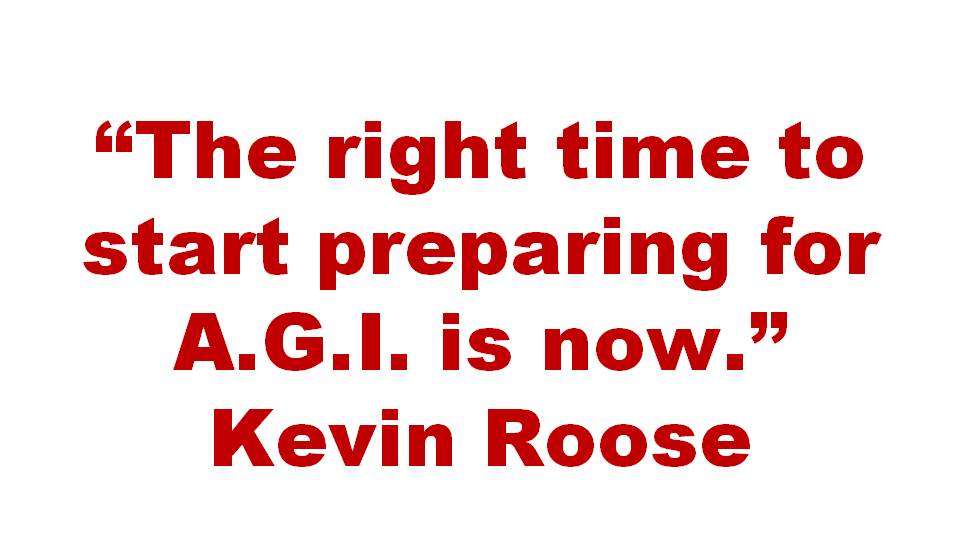by Peter A. Arthur-Smith
“I believe that most people and institutions are totally unprepared for the A.I. systems that exist today, let alone more powerful ones, and that there is no realistic plan at any level of government to mitigate the risks or capture the benefits of these systems.” Kevin Roose wrote in Sunday New York Times-The Shift article, March 2025, entitled: ‘AI Will Soon Be Smarter than Humans. Let’s Discuss.’

Roose went on to write: “I’ve come to believe that’s what’s happening in A.I. right now is bigger than most people understand.” Considering this proposition, I wonder how many people are thinking about its burgeoning sister proposition A.G.I., Artificial General Intelligence, where it will be able to think and reason far better than humans. It’s likely just around the corner, where it could also become known for being “…in the realms of scheming and deception.”
Satya Nadella, Microsoft’s CEO, in his 2017 book Hit Refresh, waxed considerably about forthcoming advances in mixed reality (MR), artificial intelligence (AI), and quantum computing (QC). He discussed at length the many practical applications of all three, where some are clearly apparent today. His company, as for many others, is investing huge amounts of money and human resources into a race to capitalize on all three. And many of his book’s predictions were already more than seven years ago.
With this astounding reality, we ought to be alarmed at the lack of preparation and foresight currently emanating from our political, commercial and institutional leaders. They’re often too preoccupied with current domestic, geo-political and/or emotional societal issues that suit their personal appetites and interests. That reality underscores our natural inclination to be distracted with today’s issues over those of tomorrow. Enlightened leaders are the ones who properly balance both.
If A.I. is morphing into A.G.I., then our leaders need to morph much more into thinking about tomorrow’s priorities just as much as today’s. Of course, they’ll argue that today’s issues are much more tangible and concrete, while they feel insecure about predicting tomorrow’s realities. But in the same way that A.G.I. has to step-up in its “reasoning” and “empathy” capabilities – two human strengths – to meet its promise, so leaders have to step-up in their capabilities to predict and configure tomorrow’s issues and potential solutions. This includes getting away from their fixation on numbers and instead create people-oriented cultures that can cope with our new world order.
Borrowing again from Roose’s article, some of the urgent issues that need discussion and resolution include: Will our –
» Energy infrastructure be capable of handling the enormous increase in energy demands?
» Cybersecurity defenses be tough enough to handle the malicious intrusions by bad actors?
» Current approval processes be able to handle the rapid advances in A.I. designed drugs?
» Governmental and societal mechanisms/regulations prevent the most serious harms? Here-to-fore governments tend to be reactive rather than proactive, i.e. wait until something nasty happens before doing anything that will be politically rather than societally advantageous.
» Education system adapt quickly enough to educate students in their emotional development over soon-to-be-obsolete technical skills, so as to handle enormous societal changes?
» Commercial and institutional environments adapt quickly enough to handle the rapid advances in A.I. and A.G.I.?
» Leaders take a leap forward in their ability to prepare for and orchestrate tomorrow’s adaptation of these technologies just as much as handling today’s? – Others will concur with me: You define what tomorrow will look like, rather than wait to have it defined for you.
Consequently, leaders should stipulate that A.I. and A.G.I. must be designed to augment humans rather than replace them. The latter encourages evil and enormously disruptive intentions. We shouldn’t allow both to dominate our lives. Everyone who’s concerned about these issues should intentionally lobby their politicians to get their act together fast and produce sensible guidelines for both mankind and automation to flourish side by side: both to work in each other’s best interests, rather than being fixated on narrow-minded “numbers.”
Nadella, in his above mentioned book, also shared: “…we business leaders must replace our labor-saving and automation mindset with a maker and creation mindset.” (P208)
